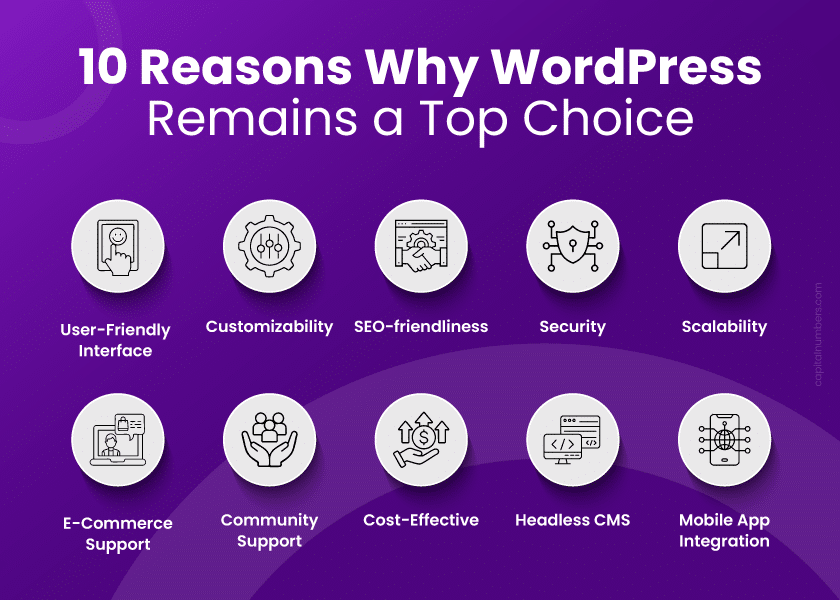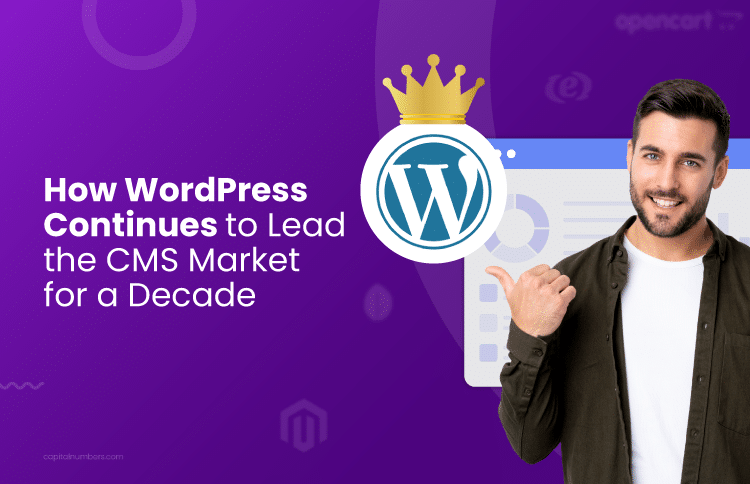How WordPress Continues to Lead the CMS Market for a Decade
Table of Contents
WordPress has been the go-to platform for building websites for over a decade, and its popularity continues to grow. Known for its user-friendly interface, flexibility, and strong community, WordPress powers millions of blogs, business websites, and online stores. Whether you’re a developer or a business owner, WordPress offers the tools needed to create, manage, and scale your online presence.
As the CMS market leader, WordPress adapts to new trends and technologies, from mobile-first design to AI integration. It remains highly relevant by continuously evolving to meet the changing needs of businesses and developers. If you’re curious about how WordPress has maintained its top position, read on to explore the factors behind its success.
The Evolution of WordPress
WordPress was released in 2003 as a simple blogging platform. Over the years, it grew into an open-source CMS (Content Management System), becoming the top pick for building all kinds of websites. Today, it’s the CMS market leader, used by millions worldwide for its simplicity and flexibility.
Major WordPress Versions & Key Features
- WordPress 1.0 to 3.0: These early versions were focused on blogging. They offered basic themes and plugins, making it easy for users to start their blogs without technical knowledge.
- WordPress 3.0: This version introduced custom post types and the “Twenty Ten” theme, expanding WordPress into a full CMS. With this, users could manage content more flexibly.
- WordPress 4.x: WordPress 4.x improved the user experience with a visual editor, allowing users to see their content as they created it. Media handling also became easier, making it simpler to add images and videos.
- WordPress 5.x (Gutenberg): The Gutenberg block editor was introduced, offering a more flexible and visual way to create content. It allowed users to build custom layouts without coding.
- WordPress 6.0 and Beyond: WordPress 6.0 and its subsequent versions introduced full-site editing and better customization options, making it easier for developers to build unique websites. WordPress continues to evolve with new features to support all kinds of websites.
WordPress has transformed from a simple blogging tool to a powerful CMS that meets the needs of businesses of all sizes. Its regular updates make it easy to create both simple and complex websites. As the web keeps evolving, WordPress continues to adapt, offering a flexible and scalable solution for businesses around the world.
Ready to build a powerful WordPress website that grows with your business? Hire WordPress developers to unlock the platform’s full potential, ensuring your site is scalable, customizable, and optimized for long-term success in today’s digital landscape.
10 Reasons Why WordPress is a Top Choice Even Today?

Whether it’s building a simple blog or a complex e-commerce site, WordPress is a top choice among users. But why? What makes WordPress a market leader in the CMS industry? Here we have listed down the key WordPress advantages:
1. User-Friendly Interface
WordPress offers an intuitive, easy-to-navigate dashboard that allows users to manage their content regardless of technical skill. Whether you’re a beginner or an expert, WordPress simplifies content creation and site management, making it suitable for businesses and personal projects alike.
2. Customizability
WordPress gives users access to thousands of themes and plugins, allowing for limitless customization. WordPress offers endless possibilities, whether you need a custom design, specific functionality, or unique features. It’s perfect for businesses of all sizes looking for flexibility without the need for extensive development knowledge.
3. SEO-friendliness
WordPress is built with SEO in mind. It provides features like clean URLs, mobile optimization, and customizable metadata. Also, with powerful SEO plugins like Yoast SEO, users can effortlessly optimize their websites, improving their chances of ranking higher on search engines and driving more traffic to their sites. You can optimize WordPress with Core Web Vitals to further enhance SEO performance. It will help improve site speed, user experience, and overall search rankings.
4. Security
WordPress takes security seriously with regular updates, robust security features, and various plugins like Wordfence and Sucuri. These tools help keep websites protected against threats like hacking and malware. The WordPress community and developers continue to release patches and updates, ensuring high levels of protection for users.
5. Scalability
Whether you’re starting with a personal blog or managing an enterprise-level website, WordPress grows with you. It can easily handle increased traffic, content, and functionality as your site expands. The platform’s scalability makes it the ideal solution for businesses that need a website that can evolve.
6. WordPress for E-Commerce
WordPress, paired with WooCommerce, is one of the most popular platforms for building online stores. WooCommerce provides powerful e-commerce features like product management, payment gateways, and inventory tracking. It’s a flexible and cost-effective option for businesses building fully customized e-commerce stores with WordPress.
7. Strong Community Support
One of WordPress’ greatest strengths is its massive global community. With millions of active users, developers, and designers, WordPress users have access to extensive resources, including forums, documentation, tutorials, and support from experts. This support system ensures users can solve issues and find solutions quickly.
8. Cost-Effective
As an open-source CMS, WordPress is free to use, and many of its themes and plugins are also free or affordable. This makes WordPress a cost-effective solution for businesses, especially those starting with a smaller budget. The flexibility and vast library of free resources make it a highly affordable platform in comparison to others in the market.
9. Headless CMS Potential
WordPress is evolving with the times. With its headless CMS capabilities, WordPress allows businesses to separate the front-end and back-end. This approach provides more flexibility for developers, as they can use any front-end technology while managing content through WordPress. For example, combining headless WordPress with React allows for highly dynamic and interactive websites. It’s ideal for dynamic, multi-channel websites that require customization beyond the traditional CMS setup.
10. Mobile App Integration
WordPress isn’t just for websites – it’s also great for mobile apps. By building a mobile app using Flutter and WordPress, businesses can easily pull content from WordPress to create fast and engaging mobile experiences. This integration helps manage content across web and mobile platforms efficiently. Also, it allows for seamless updates, as any changes made in WordPress are automatically reflected in the mobile app without requiring additional development work.
WordPress continues to evolve to meet the needs of modern web development. Regular updates, including features like full-site editing and improved site-building tools, ensure that WordPress remains relevant. As the digital world shifts, WordPress adapts – incorporating the latest trends, technologies, and practices to stay ahead of the competition.
You May Also Read: Mastering WordPress: A Comprehensive 100-Point Checklist for Website Owners
Comparisons with Other CMS Platforms
When it comes to choosing a CMS, WordPress continues to lead the pack due to its flexibility, ease of use, and scalability. Here’s how WordPress stacks up against other popular CMS platforms:
WordPress vs. Joomla
WordPress is considered the best CMS platform for its simplicity and customizability. It’s user-friendly, with an intuitive interface, making it perfect for beginners. Joomla, while also an open-source CMS, is better suited for more complex websites, offering more advanced features, but it’s harder for beginners to use. WordPress is more versatile and customizable, making it the preferred choice for most users.
WordPress vs. Drupal
WordPress is a CMS industry leader because it is easy to manage and has an extensive plugin ecosystem that enhances its capabilities. WordPress website development is straightforward and can be done without advanced technical skills. Drupal, on the other hand, offers greater flexibility and is ideal for complex, custom-built applications, but it comes with a steeper learning curve. WordPress remains more accessible for users looking for ease of management and a wide selection of tools.
WordPress vs. Wix/Squarespace
WordPress is the CMS market leader when it comes to scalability and customization. It allows users to create websites of any size and complexity, offering greater flexibility through plugins, themes, and custom development options. Wix and Squarespace are simpler, more user-friendly platforms ideal for those building smaller websites quickly. However, they fall short in offering the same level of customization and scalability that WordPress can provide, especially for businesses that need to grow or have specific functionality needs.
WordPress continues to be the open-source CMS of choice for a wide range of users, from beginners to advanced developers. Its ability to scale, customize, and integrate with a range of tools keeps it at the top, while other CMS platforms like Joomla, Drupal, and Wix/Squarespace cater to more specific needs.
You May Also Read: Drupal vs. WordPress – A Comparison from SEO and Digital Marketing Perspective
5 Big Brands Using WordPress
WordPress is a versatile platform used by many leading brands across various industries. From entertainment to tech, it powers some of the most popular websites, making it a desired choice for businesses of all sizes.
1. Mercedes-Benz
Mercedes-Benz uses WordPress for its sleek, modern website that showcases its luxury vehicles and innovations. The platform helps keep the site visually appealing and easy to update.
2. Spotify
Spotify uses WordPress to manage its blog and share updates on artists, music, and new features. The platform allows them to publish content efficiently and keep users engaged.
3. Sony Music
Sony Music relies on WordPress to share news about artists, new releases, and upcoming events. It makes managing and updating their content quick and easy.
4. Microsoft News
Microsoft uses WordPress to power its news portal, offering the latest updates on products and technology. WordPress helps handle large volumes of content with ease.
5. TED Blog
TED uses WordPress to run its blog, offering articles, talks, and updates about its conferences and events. WordPress provides a clean and simple interface for users to engage with inspiring content.
These examples show how WordPress supports some of the world’s biggest brands, helping them manage content and keep their websites running smoothly.
The Future of WordPress
Although WordPress is a market leader today, what is its future? Can it continue to improve and adapt with time? How will it evolve to meet the ever-changing demands of web users and developers? Let’s explore.
Adapting to Changing Web Trends
WordPress is known for its flexibility. It stays up-to-date by focusing on mobile-first design, ensuring websites work well on mobile devices. It also improves site speed with features like Accelerated Mobile Pages (AMP) for faster browsing. Regular updates help keep WordPress in line with the latest web technologies.
Future Developments
In the future, WordPress will introduce new features. Full-site editing will give users more control over design, making customization easier. Better theme options will allow for more personalized sites, and new e-commerce tools will help businesses manage stores. Multisite support will let users manage multiple sites from one WordPress installation.
WordPress in the Age of AI and Automation
As AI and automation shape the digital world, WordPress is adapting to include these technologies. AI tools will help automate tasks and enhance content creation, making site management easier. Machine learning will improve SEO, boosting WordPress sites’ rankings and traffic. By embracing these technologies, WordPress remains a strong, future-ready platform.
With its regular updates and innovation, WordPress will keep leading and adapting to the changing needs of the digital world.
You May Also Read: The Next-Level of WordPress Performance Optimization with React-Powered Widgets
Bottom Line
WordPress has been a popular choice for building websites for over a decade due to its flexibility and ease of use. It continues to evolve, staying current with the latest trends to meet the needs of businesses and developers.
Looking ahead, WordPress will continue to be the leader in the CMS world. The growing popularity of WordPress means there are more WordPress development services available than ever. These services help businesses of all sizes, offering expert developers who can create custom websites to fit different needs. As WordPress keeps improving, these services will ensure that businesses can create websites that keep up with the latest trends and meet their goals.















